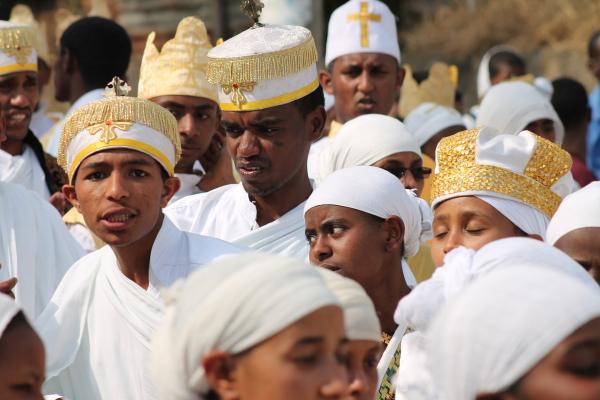What role does our faith, our religiosity, play in making decisions? Are we more comfortable putting our fate into God’s hands or steering our fate? The current study looks at the degree that Ethiopian households are risk-averse or risk-avid to new technology and new ways of acting economically, based on measures of the strength of their beliefs (religiosity). It challenges the belief that these poor and largely formally uneducated farmers are superstitious and risk-averse.
Measuring religiosity
The researchers consider the response to three questions:
- Does the head of household believe in “God’s intervention in one’s success?”
- How much do they contribute to their church or mosque in the last month?
- How important is “luck” in one’s success?” [1]
The responses were “weighed” based on the physical distance from their homes to church or mosque, a reasonable measure of the fervor of religious belief when the only way to worship is walking several kilometers. The mean time in the study was 23 minutes of walking to services.
Measuring risk-taking
The researchers used a choice of multiple lotteries with varying payouts and risks. One lottery offers a 50:50 chance of winning 50 Ethiopian Birr (roughly $1.00 US or, by my approximation, about 56% of a day’s wages). The second lottery initially offers a sure payout of 50 Birr, but then the payout declines to just 5 Birr over eight steps. The risk-averse will always choose the first lottery; the risk-neutral individual will switch when the second lottery’s payout is greater than the 50:50 risk [2]
 As the table shows, 30% of these households were risk-avid, 20% quite risk-averse. The rest tended towards the risk-loving end of the spectrum.
As the table shows, 30% of these households were risk-avid, 20% quite risk-averse. The rest tended towards the risk-loving end of the spectrum.
“…religiosity positively affect the number of safe choices suggesting that more religious farmers are more risk-taking (as reflected by fewer number of safe choices).”
The researchers also had focus group discussions with these farmers. The driving force behind risk-taking; God is both omniscient and just.
This study suggests there is more to the why of decision making, especially in developing countries than the “woke” narrative that imperialistic forces like Bayer are taking advantage of the ignorant farmers, addicting them to weed killers and Franken-seeds instead of their traditional farming. Could it be that these farmers, among the world’s poorest, have placed their faith in something more than Bayer in making their decisions? Could it be that the woke narrative is itself in need of reconsideration?
[1] The researchers report that cultural Ethiopians often equate luck with “divine intervention.”
[2] The first lottery with the 50:50 risk pays an average of 25 Birr. Once the second lottery’s sure payout is less than 25, taking a risk is a better bet
Source: Are religious farmers more risk-taking? Empirical evidence from Ethiopia Agricultural Economics DOI: 10.1111/agec.12697




